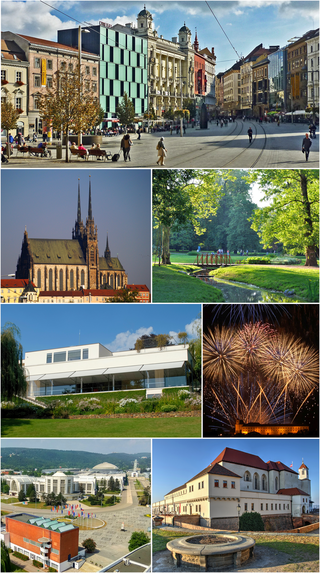Related Research Articles

Brno is a city in the South Moravian Region of the Czech Republic. Located at the confluence of the Svitava and Svratka rivers, Brno has about 390,000 inhabitants, making it the second-largest city in the Czech Republic after the capital, Prague, and one of the 100 largest cities of the EU. The Brno metropolitan area has almost 700,000 inhabitants.

The history of the Jews in Slovakia goes back to the 11th century, when the first Jews settled in the area.

Prof. PhDr. Zdeněk Kárník, DrSc. was a Czech historian and pedagogue.
Václav Chaloupecký was a Czech historian, a student of prominent Czech historian Josef Pekař and the main representative of historians in mid-war Slovakia.

The Holocaust in Bohemia and Moravia: Czech Initiatives, German Policies, Jewish Responses is a book by the German historian Wolf Gruner on the Holocaust in Bohemia and Moravia, the Czech-majority parts of Czechoslovakia partially annexed into Nazi Germany during the German occupation of Czechoslovakia. Beginning before the Munich Agreement, Gruner's book covers the various stages of persecution of Jews which led to their deportation and murder. He argues that the role of Czech collaboration and local initiatives was greater than has been conventionally assumed, and also that Jewish resistance to persecution was substantial. The book has received mixed reviews; some Czech historians have disagreed with Gruner's conclusions while other reviewers generally praised the book with some reservations. The book was published in German in 2016 and in English and Czech in 2019. It received the 2017 Sybil Halpern Milton Memorial Book Prize of the German Studies Association.

The Partisan Congress riots were attacks on Jews in Bratislava and other cities and towns in the autonomous Slovak region of Czechoslovakia between 1 and 6 August 1946. Nineteen people were injured, four seriously, in Bratislava alone.

The Czechoslovak myth is a negationist narrative that Czechoslovakia between 1918 and 1938 was a tolerant and liberal democratic country, oriented towards Western Europe, and free of antisemitism compared to other countries in central and eastern Europe. For example, the country was described as "a welcoming and tolerant place for Jews," and an "island of democracy in Eastern Europe".
Miloslav Szabó is a Slovak historian who is employed by the Faculty of Arts of Comenius University in Bratislava.
References
- ↑ "Frankl, Michal 1974-". WorldCat Identities . Retrieved 16 April 2020.
- ↑ "Michal Frankl". www.ehri-project.eu. 20 January 2015. Retrieved 16 April 2020.
- ↑ Hadler, Frank (2017). "Michal Frankl – Miloslav Szabo, Budování státu bez antisemitismu? Násilí, diskurz loajality a vznik Československa [Erbauen des Staates ohne Antisemitismus? Gewalt, Loyalitatsdiskurs und die Entstehung der Tschechoslowakei]". Judaica Bohemiae. LII (2): 136–140. ISSN 0022-5738.
- ↑ "Budování státu bez antisemitismu? Násilí, diskurz loajality a vznik Československa". Týdeník Respekt. Retrieved 11 May 2020.
- ↑ Hadler, Frank (21 December 2018). "Frankl, Michal/Szabó, Miloslav: Budování státu bez antisemitismu? Násilí, diskurz, loajality a vznik Československa [Erbauen des Staates ohne Antisemitismus? Gewalt, Loyalitätsdiskurs und die Entstehung der Tschechoslowakei]". Bohemia (in German). 58 (1): 172–174. doi:10.18447/BoZ-2018-4394.
- ↑ Kieval, Hillel J. (2009). "Book Review: "Emancipace od židů": Český antisemitismus na konci 19. století ["Emancipation from the Jews": Czech Antisemitism at the End of the Ninet". Judaica Bohemiae. XLIV (1): 141–143. ISSN 0022-5738. CEEOL 208261.
- ↑ Klein‐Pejšová, Rebekah (17 April 2009). ""Emancipace od židů." Český antisemitismus na konci 19. Století". East European Jewish Affairs. 39 (1): 144–145. doi:10.1080/13501670902903555. S2CID 162261493.
- ↑ Červený, Radek (1 January 2004). "Knihovnice.cz". www.knihovnice.cz.